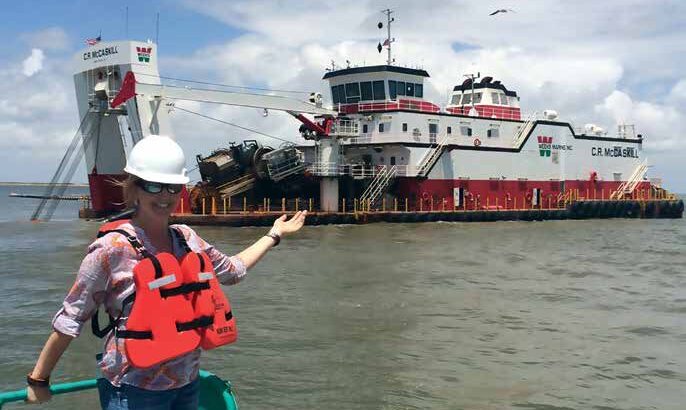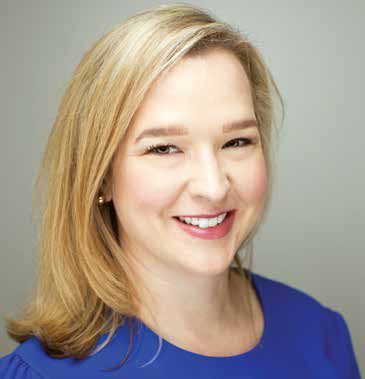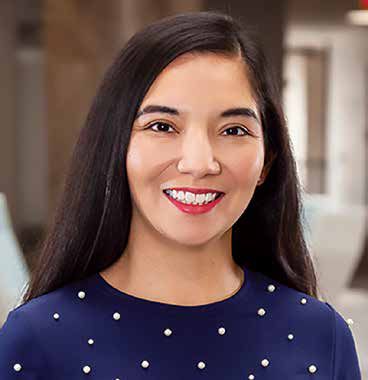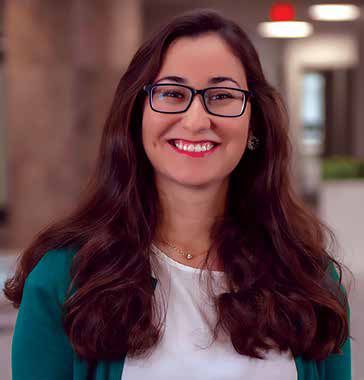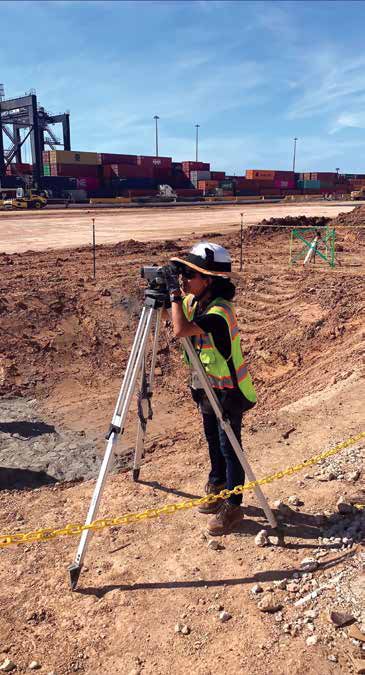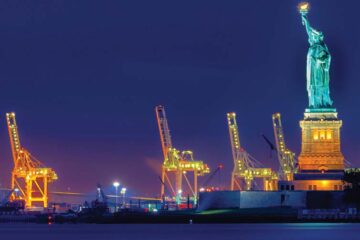Women engineers still are a minority on the job in marine construction, and rarer still in the field, let alone in project management. But their numbers— as well as their experience, seniority and expertise—are growing rapidly.
By Warren Miller, Marine Construction Magazine
Construction has always had an egalitarian, if male-centered ethic—even the sons of the owners of family-owned construction companies often worked their way from the ground up. Literally. That didn’t often apply to the owners’ daughters, however. It was rare that a daughter ascended to leadership of a construction company. One reason was their lack of field experience. But in an industry of increasing complexity, a civil engineering or related degree—combined with field experience in project management—is opening new possibilities for women in marine construction. Marine Construction Magazine interviewed a group of female engineers who are in or on track to enter management about their backgrounds and challenges, their work today, and what the future holds for women in engineering.
Ashley Judith
- Project Manager and Coastal Engineer,
- AECOM, Houston, Tex.
- PROFILE: Native Texan. Grew up east of Dallas, has lived in Houston for 11 years.
- EDUCATION: B.S. in Ocean Engineering, Texas A&M; M.S. in Port and Terminal Management, Lamar University; Diplomate, Navigation Engineering (D.NE), Academy of Coastal Ocean Port & Navigation Engineers (ACOPNE).
Jaqueline Martinez
- Senior Project Engineer, McCarthy
- Building Companies, Houston, Tex.
- PROFILE: Born in Mexico City and raised in Monterrey, Mexico.
- EDUCATION: Earned B.S. in Civil Engineering at Tecnológico de Monterrey, and an M.S. in Construction Engineering and Project Management at the University of Texas at Austin.
MCMag: How did you become an engineer?
Ashley Judith, Project Manager and Coastal Engineer, AECOM: I knew in high school I was going to do something in science and math. My mom was a guidance counselor at high school, so she set me up with all the science classes. I did biology, chemistry, and physics and competed on the math and science team. When I got to Texas A&M, I was able to take high-level courses quickly.
Jaqueline Martinez, Senior Project Manager, McCarthy Construction: Construction always drew my attention. I’d originally planned to go into architecture, and as I moved along in school my strength was in math and science. I looked at some engineering majors, and civil was closest to construction.
Valeria Zebrowski, Senior Project Engineer, McCarthy Construction: I wasn’t a math-andscience kid. I was the polar opposite! I was considering sound engineering and music, but one of my brothers did chemical engineering, and encouraged me to look into civil engineering. I took a course and thought, I actually do like this. I’d always looked around construction sites and was fascinated by the work. There was a lot of construction going on around my university.
MCMag: When you started your career, were there other female engineers working with you? And did you work on job sites?
Ashley: My first job out of college was with Great Lakes Dredge & Dock. The job was 100-percent travel, three weeks on and one week off. I’d stay in some kind of long-term rental apartment. I usually roomed with administrative women, who were older ladies, but that was a good thing. I can think of only one other woman in the field with an engineering background and who was a manager. Valeria: I was in the office at first. I started in estimating. McCarthy was building medical centers, a holocaust museum, and I was crunching a lot of numbers.
There was only other female in the VDC [virtual design and construction] department. In my junior year of college, though, I interned at Fort Bliss, a joint venture job between Clark and McCarthy, and there were a number of females at the job site. My last project in Freeport included a female field engineer and a safety officer.
Jaqueline: Not when I was getting started. In college, I had a professor who was a role model. She’s a structural engineering professor and a very good teacher. I really looked up to her.
MCMag: What were the challenges when you started working in an almost all-male environment?
Jaqueline: The biggest challenge was just finding someone that I could truly relate to. Almost everyone I worked with in Mexico was male. I had another female colleague who was the only one I felt comfortable with, asking questions, just developing. I didn’t feel as comfortable asking questions to male coworkers.
Ashley: Women in engineering hear that question a lot. It takes a certain kind of personality to work in this industry, but I didn’t have any bad experiences with guys in the field. I worked with the guys in the hopper dredges the most. Hopper dredges are self-propelled, so everyone working on them has to be licensed by the Coast Guard. The men on the boats and the tug were always incredibly respectful.
Valeria: I never felt a big gap, mainly because I have two older brothers and I have such a versatile pace in things. I can strike up a conversation with almost anyone. I felt more of cultural gap when I joined McCarthy. For one thing, everyone here loves to fish, and growing up in the desert, that was not one of the hobbies I had.
Jaqueline: Me, neither!
Valeria: Or hunting. And golf was too expensive, so I never did that, either.
Ashley: Building rapport happens in different ways. I remember being on a dredge and messing with the computer that records the data, and I pulled a Leatherman [multi-tool] out to tighten a connection. One of the guys said, “Oh, you have that?” Well, yes, I do.
MCMag: How important was working in the field to your career advancement?
Jaqueline: I took a one-year break in between my bachelor’s and master’s degrees because I wanted to get field experience, to build my profile and also to get the most out of my masters. I’d never been onsite until then. I started working for a commercial general contractor. My first marine experience was with McCarthy, after I got my masters and relocated to Houston.
I studied construction engineering and project management. I did some building information modeling, project controls, construction productivity and project finance. I also took some courses at UT’s McCombs School of Business, such as organizational behavior. I wanted to make sure I had both the education and the field experience.
Ashley: In construction, starting out in the field is the best way to understand how things are done, how the project is being executed. Now I’m in the office doing consulting, design and engineering, and I don’t get out as much, but that’s just a natural progression of your career.
We are working with Port of Houston on the channel deepening, which started planning in 2016 and is about to begin construction. I have new hires on my team, and I’m so excited that they’ll get the best of both worlds. They’ll be heavily involved in the construction management of a large project, but also in the office part of the design and planning— understanding how we got there, why things in the contract are there.
MCMag: How important has mentoring been in your career, and are you involved now in mentoring?
Valeria: Being mentored really accelerated my knowledge. I worked on a long-term project in Freeport and I got to see everything from start to finish. It went through two managers, and the first manager was a woman. She was tough on me, which took some adjustment on my part, but she taught me some important things, such as how to get organized, how to network, to go above and beyond. My safety manager there also taught me how to network. Networking wasn’t in my nature!
Ashley: AECOM has a strong mentoring program. From the time you start, you’re matched with an on-boarding buddy,” and then we have regular check-ins. It’s a huge component, and something I try to do now. Having open conversations with young women and young men is something I’ve gotten better at as I’ve gotten older. When I first was in the field, it wasn’t that way, but overall, I had a good experience.
Jaqueline: At McCarthy, we have Partnership for Women, an internal group that all McCarthy women are part of. That kind of support may not be present industry-wide, but I do think that there’s more awareness, both for recruiting and retention, which are equally important.
MCMag: What are some of the ways in which women’s partnerships help?
Ashley: Women in engineering often feel like they have to have their arms around something 100 percent, while men will jump in even though they know they’re not an expert in everything that the project might encompass. My advice to young female engineers is not to let perfect be the enemy of good. You don’t have to know everything. If you are on a team a with a strong mentor, you’re not going to fail. Your team will not let you fail.
I think women are more likely to question whether they’re the right person for an assignment, and can miss opportunities. I spoke today with a woman in our company on the East Coast who’s in consideration to be a project manager. She said, “I don’t know much about certain things,” and I said, “Well, you’ve got our team.” At AECOM, we have pretty much every specialty in-house, and an internal network and tools to share that expertise company- wide. You can reach out.
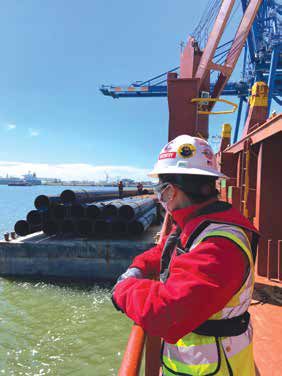
Valeria: McCarthy’s Partnership for Women has been great in helping me come out of the shell a little more. It’s interesting to learn from each other, especially from women who have families. I have a better idea what my career would look like if I start a family, what the options are, and how to manage them.
MCMag: What are some dynamics to your career path that people may not be aware of?
Jaqueline: In the short-term, I’m focused on project management and making the jump to the assistant supervisor role so I can continue growing and learning how field activities are executed. Then back to project manager, then vice president level. Doing the same work, but in leadership positions.
One thing to highlight is how flexible the industry has become with working from home. McCarthy rolled out some guidelines about flexibility to work from home. That became more common during COVID, but leadership also realizes that women in construction will get to the phase of their lives when they start families, and the company will work with us. We won’t have to put a hold on our careers. We won’t stagnate professionally.
McCarthy Partnership for Women
WOMEN IN CONSTRUCTION STATISTICS
- Women made up 10.3% of all construction employees in 2019;
- Of the jobs held by women 86.7% are in office positions, while 13.3% are working on jobsites;
- Only 13% of construction firms are female-owned;
- Women are expected to make up 46% of the industry by 2022;
- Women in the U.S earn on average 81.1 percent of what men make. The gender pay gap is significantly smaller in construction occupations, with women earning on average 99.1 percent of men make.
McCARTHY’S COMMITMENT TO WOMEN IN CONSTRUCTION
McCarthy understands the challenges facing the construction industry, especially obstacles women in construction encounter throughout their careers. These obstacles fuel McCarthy’s commitment of cultivating a diverse workplace which partners grow and thrive in a more inclusive industry. McCarthy’s female headcount has increased 61% from 2009 to 2019, nationally.
The McCarthy Partnership for Women—the company’s response to challenges within the industry—is a national, executive-sponsored, employee-driven resource group providing opportunities, support and a network for Mc- Carthy’s female partners. This internal program aims to mentor and grow women currently employed with the company as well as recruit women to help reduce the labor gap in construction and bring diversity in thought to address client challenges.
The program provides a wide variety of opportunities to combat the industry challenges and empower McCarthy’s female partners to succeed. Focus areas include:
- Personal and professional development;
- Internal and external networking;
- Platform for sharing goals and exploring solutions;
- Fostering a diverse, inclusive workplace and construction community;
- Community outreach to young women considering options for their future.
The McCarthy Partnership for Women enables employees to grow professionally by providing them with opportunities to participate with McCarthy offices both regionally and nationally. Opportunities include:
- The McCarthy Partnership for Women National Conference;
- Customized Learning and Development curricula;
- Mentoring support;
- Networking events;
- Regional and national industry events.
FEMALE PARTNERS ON THE JOB
McCarthy is fortunate to include many female partners on and off the field with roles such as project manager, scheduling project manager, superintendent, project engineer, VDC engineer and senior estimators. Women help propel Mc- Carthy and the construction industry forward.
Women have helped deliver landmark projects including: Plano ISD Fine Arts Center, CHRISTUS Trinity Mother Francis, Museum of Fine Arts, Houston Kinder Exhibition Hall and Glassell School of Art, CHRISTUS Spohn Shoreline Hospital, Southwest Airlines’ Hangar at Houston Hobby, Chattahoochee Technical College Health Science Building and Hartfield Jackson Atlanta International Airport Central Passenger Terminal Complex Landslide Modernization.
Republished from Marine Construction Magazine Issue V, 2022






